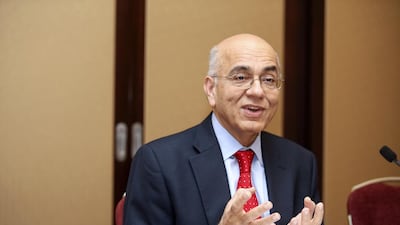Masood Ahmed has the manner of a medical man about him. Calm in delivery and measured in tone, he could easily be the senior consultant giving reassurance and comfort to a patient worried about the long term and seeking treatment that will ensure future health.
Mr Ahmed, as director of the Middle East and Central Asia department of the IMF, has had quite a few ward visits to make in the region recently. He was in the Arabian Gulf two weeks ago delivering his overall annual health check, the Regional Economic Outlook, and back again this week to speak about the Middle East at the summit of the World Economic Forum in Dubai.
The prognosis: the patients – the diverse economies of the region – have made some progress, but still face complications, and are at risk from global contagions that could send the charts heading in the wrong direction.
One difficulty for Mr Ahmed lies in finding a treatment to suit all the cases under his watch, which stretches from Afghanistan to Morocco and takes in many of the former Soviet states. “Economic developments continue to reflect the diversity of conditions prevailing in the region,” he said in the latest assessment.
Within the core of the region, there is a basic divide between oil-importing countries such as Egypt, and oil exporters like the UAE.
“Some high-income oil exporters, primarily in the GCC, continued to record steady growth and solid economic and financial fundamentals, albeit with medium-term challenges that need to be addressed,” he says.
“Other countries – Iraq, Libya and Syria – are mired in conflicts with not only humanitarian but also economic consequences, while others – mainly oil importers, are making continued but uneven progress in advancing their economic agendas.”
Oil is both cause and cure, and the recent downwards trend in the price of crude has given rise to complications. Energy bills are lower for the importers, giving an economic fillip to economies badly in need of it.
But for the exporters, such as the UAE, lower oil prices mean reduced government revenue and pressure on public finances.
The GCC as a whole could expect a US$170 billion drop in revenues if oil stays at the present rates, Mr Ahmed estimates, and even mighty Saudi Arabia could face budget deficits as early as next year.
Despite his doctoral manner, Mr Ahmed is a lifelong economist. Born and brought up in Pakistan, he was educated at the London School of Economics and has spent most of his career at the World Bank and the IMF, the two big beasts of the global economics scene. He spends most of his time in Washington.
He talks of his “team” – one imagines a group of bright young men and women in white coats and clipboards – which for the past fortnight has been giving the UAE economy another check-up, and has generally come up with a comparatively clean bill of health, even allowing for the oil price decline.
The country’s GDP will grow by about 4.25 per cent next year, he calculates, with the non-oil sector looking comparatively buoyant with 5 per cent growth.
“The UAE’s break-even is lower than most of the rest of the GCC, at about 79 dollars, and will be lower next year. The country has large financial buffers, so the oil price decline will have little immediate affect on the UAE,” he says.
However, he believes UAE policymakers “will have more of a conversation” about subsidies of energy and other utilities – just as there have been recent rethinks in Kuwait and Oman – although he says: “The UAE has had relatively higher prices for some time anyway, so it is not as big an issue here as in other countries.”
On his UAE check-up in the spring, Mr Ahmed was worried that the rise in property prices, especially in Dubai, might be the beginnings of another “bubble” in the market, which caused so much trouble in 2009, but he appears more sanguine now.
“Our fears have abated to some degree,” he says, pointing to the measures brought in by the government of Dubai to combat excessive property price inflation.
Dubai is in the middle of another rapid expansion phase, with new projects regularly announced and the build-up to Expo 2020 progressing relentlessly. The official cost of the Expo for the Dubai government stands at $43bn.
The emirate still has about $140bn of debt, including the obligations of government-related enterprises at the heart of the new cycle of growth, Mr Ahmed estimates.
So does Dubai have sufficient financial capacity to fund Expo and the big development projects that have recently been announced?
Mr Ahmed is awaiting a second opinion on this. “We have a team looking at Dubai’s medium-term financial needs. The markets suggest Dubai can mobilise large amounts of financing, but the issue I foresee is the cost. Will it affect the price of finance for Dubai?” he asks.
The answer will come after the “team” has completed its diagnosis of the emirate’s finances, probably by next spring.
fkane@thenational.ae
Follow The National's Business section on Twitter

